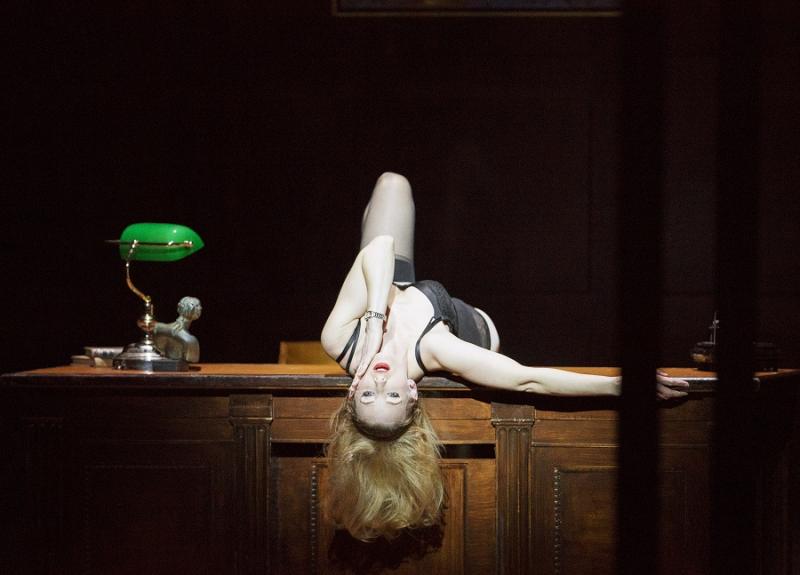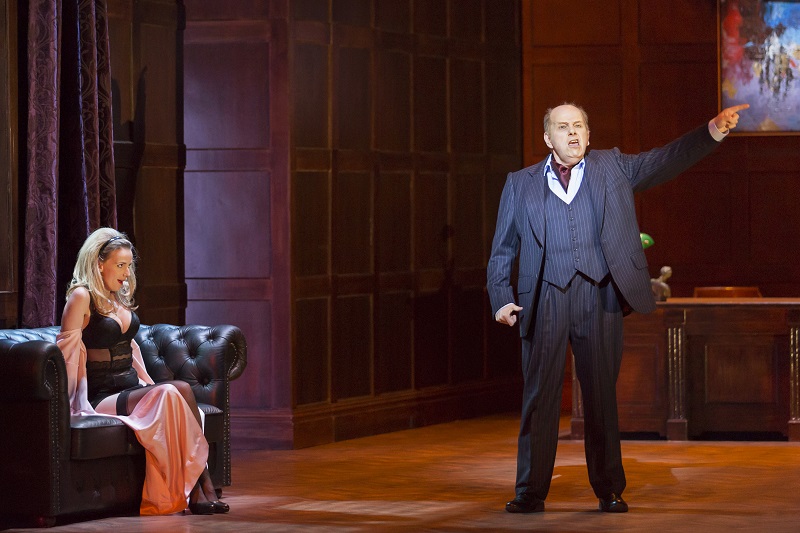Boulevard Solitude, Welsh National Opera | reviews, news & interviews
Boulevard Solitude, Welsh National Opera
Boulevard Solitude, Welsh National Opera
Henze's take on Prévost exponentially improves on WNO's latest Puccini

Reviewing WNO’s Manon Lescaut a couple of weeks ago, I suggested that its director, Mariusz Treliński, had devised the production in terms of Henze’s Boulevard Solitude, “and simply tyre-levered the Puccini into it.” QED. Here are the same railway station, the same trains flashing by, the same barman, the same slinky, raincoated – or less – Manons (plural), the same general air of transient sleaze. Boris Kudlička’s designs have changed in detail but not in essence.
But the main news is Henze’s opera itself. It was his first, composed in the early Fifties in the shadow of post-war Berlin, a time of aimless wandering through still half-ruined streets, and the frenetic search for one or another kind of oblivion. Grete Weil’s libretto filters out the charm of Prévost’s Amiens, and hurries on to a Zola-esque world of high-class whores, loveless sex, drugs, alcohol and murder. It might seem an unpromising – or too promising – mix for an opera. But somehow Henze breathes musical life into it, and without the tendency to droop and drift that came to typify his music after he moved from Germany to Ischia in 1953.
There is a flow of ideas that never seems in danger of drying up yet never gets overloaded.
Like all German composers after the war, Henze was assailed with influences that had been inaccessible under the Nazis, and it took him a while to sort them out. In his early works Stravinsky, Schoenberg and Hindemith often do battle. But in Boulevard Solitude they’re absorbed into a style that, for want of any better term, one has to call Henzean. Traces of Stravinsky there still are, alongside a kind of post-Bergian lyricism that lies well on the voice; fragments of jazz fly past, Rigoletto is quoted. But beyond all these memories is an individual sensibility that is both modern and approachable, intense yet vibrantly warm and direct.
Things that stick in the mind: astonishingly delicate writing for a large percussion section, including a highly original overture that perfectly pre-echoes the uneasy, provisional, somewhat unreal encounter of Manon and des Grieux in the railway station; wonderfully refined woodwind polyphonies and richly coloured string textures; a flow of ideas that never seems in danger of drying up yet never gets overloaded.
An unexpected feature of the score is its transparency. Henze had learnt from Stravinsky how to economise in terms of sound, and he understood the importance of interior movement. This is in the best sense body music, full of rhythmic impulse even when slow moving – something that German composers before Henze often found elusive. And it’s this fastidious physicality that maps so well on to a libretto which makes no bones about the sexuality and venality that destroy its heroine in the end. Lothar Koenigs paces it all marvellously, and the orchestral playing is near enough flawless.
 Treliński predictably makes the most of the physicality. With him movement is a motif, obviously to some extent inspired, like the opera itself, by film: at the start, slow motion (à la Robbe-Grillet) offset by the normal movement of Jason Bridges’ well-drawn des Grieux – the one human being on stage, and the real emotional focus of the opera. Also circling repetition: Lilaque (Henze’s Geronte figure – the elderly lover) murdered twice, Manon – or her double – arrested at the start as well as the finish. In the surreal environment of Henze’s one-acter these devices work well, where they made nonsense of Puccini; and they go with the music. Some may find Treliński’s voyeurism – his toying with the female body – offensive. But it’s hardly out of place in Boulevard Solitude: disturbing no doubt, inappropriate hardly. His obscurities of locale are more bothersome (there are no scene changes, though Henze’s shifts are important). Read the synopsis before curtain-up.
Treliński predictably makes the most of the physicality. With him movement is a motif, obviously to some extent inspired, like the opera itself, by film: at the start, slow motion (à la Robbe-Grillet) offset by the normal movement of Jason Bridges’ well-drawn des Grieux – the one human being on stage, and the real emotional focus of the opera. Also circling repetition: Lilaque (Henze’s Geronte figure – the elderly lover) murdered twice, Manon – or her double – arrested at the start as well as the finish. In the surreal environment of Henze’s one-acter these devices work well, where they made nonsense of Puccini; and they go with the music. Some may find Treliński’s voyeurism – his toying with the female body – offensive. But it’s hardly out of place in Boulevard Solitude: disturbing no doubt, inappropriate hardly. His obscurities of locale are more bothersome (there are no scene changes, though Henze’s shifts are important). Read the synopsis before curtain-up.
The performance is superb down to the smallest role. Bridges, a bookish student in jacket and jersey, sings a nicely focused and eloquent des Grieux, and Sarah Tynan preserves immaculate control while being variously displayed and pawed at by assorted pig-masked sugar-daddies. Benjamin Bevan pulls no punches as Lescaut, an unredeemed villain compared to Puccini’s wastrel; Adrian Thompson (pictured above with Sarah Tynan) is still in fine voice, if a shade too likeable, as Lilaque. Treliński is for some reason obsessed with cleaners: in Manon Lescaut it was the student Edmondo, here des Grieux’s friend Francis (the same character, presumably). Alastair Moore makes an impact vocally, and wields a mean brush and pan. Treliński’s characters may be dirty, but at least his stations are clean. And Henze’s opera is a real find.
Add comment
The future of Arts Journalism
You can stop theartsdesk.com closing!
We urgently need financing to survive. Our fundraising drive has thus far raised £49,000 but we need to reach £100,000 or we will be forced to close. Please contribute here: https://gofund.me/c3f6033d
And if you can forward this information to anyone who might assist, we’d be grateful.

Subscribe to theartsdesk.com
Thank you for continuing to read our work on theartsdesk.com. For unlimited access to every article in its entirety, including our archive of more than 15,000 pieces, we're asking for £5 per month or £40 per year. We feel it's a very good deal, and hope you do too.
To take a subscription now simply click here.
And if you're looking for that extra gift for a friend or family member, why not treat them to a theartsdesk.com gift subscription?
more Opera
 Cinderella/La Cenerentola, English National Opera review - the truth behind the tinsel
Appealing performances cut through hyperactive stagecraft
Cinderella/La Cenerentola, English National Opera review - the truth behind the tinsel
Appealing performances cut through hyperactive stagecraft
 Tosca, Royal Opera review - Ailyn Pérez steps in as the most vivid of divas
Jakub Hrůša’s multicoloured Puccini last night found a soprano to match
Tosca, Royal Opera review - Ailyn Pérez steps in as the most vivid of divas
Jakub Hrůša’s multicoloured Puccini last night found a soprano to match
 Tosca, Welsh National Opera review - a great company reduced to brilliance
The old warhorse made special by the basics
Tosca, Welsh National Opera review - a great company reduced to brilliance
The old warhorse made special by the basics
 BBC Proms: The Marriage of Figaro, Glyndebourne Festival review - merriment and menace
Strong Proms transfer for a robust and affecting show
BBC Proms: The Marriage of Figaro, Glyndebourne Festival review - merriment and menace
Strong Proms transfer for a robust and affecting show
 BBC Proms: Suor Angelica, LSO, Pappano review - earthly passion, heavenly grief
A Sister to remember blesses Puccini's convent tragedy
BBC Proms: Suor Angelica, LSO, Pappano review - earthly passion, heavenly grief
A Sister to remember blesses Puccini's convent tragedy
 Orpheus and Eurydice, Opera Queensland/SCO, Edinburgh International Festival 2025 review - dazzling, but distracting
Eye-popping acrobatics don’t always assist in Gluck’s quest for operatic truth
Orpheus and Eurydice, Opera Queensland/SCO, Edinburgh International Festival 2025 review - dazzling, but distracting
Eye-popping acrobatics don’t always assist in Gluck’s quest for operatic truth
 MARS, Irish National Opera review - silly space oddity with fun stretches
Cast, orchestra and production give Jennifer Walshe’s bold collage their all
MARS, Irish National Opera review - silly space oddity with fun stretches
Cast, orchestra and production give Jennifer Walshe’s bold collage their all
 Káťa Kabanová, Glyndebourne review - emotional concentration in a salle modulable
Janáček superbly done through or in spite of the symbolism
Káťa Kabanová, Glyndebourne review - emotional concentration in a salle modulable
Janáček superbly done through or in spite of the symbolism
 Buxton International Festival 2025 review - a lavish offering of smaller-scale work
Allison Cook stands out in a fascinating integrated double bill of Bernstein and Poulenc
Buxton International Festival 2025 review - a lavish offering of smaller-scale work
Allison Cook stands out in a fascinating integrated double bill of Bernstein and Poulenc
 Tosca, Clonter Opera review - beauty and integrity in miniature
Happy surprises and a convincing interpretation of Puccini for today
Tosca, Clonter Opera review - beauty and integrity in miniature
Happy surprises and a convincing interpretation of Puccini for today
 Hamlet, Buxton International Festival review - how to re-imagine re-imagined Shakespeare
Music comes first in very 19th century, very Romantic, very French operatic creation
Hamlet, Buxton International Festival review - how to re-imagine re-imagined Shakespeare
Music comes first in very 19th century, very Romantic, very French operatic creation
 Falstaff, Glyndebourne review - knockabout and nostalgia in postwar Windsor
A fat knight to remember, and snappy stagecraft, overcome some tedious waits
Falstaff, Glyndebourne review - knockabout and nostalgia in postwar Windsor
A fat knight to remember, and snappy stagecraft, overcome some tedious waits

Comments
It's obviously a different
It's obviously a different opera in WNO's hands from the one that was staged at the Royal Opera, which I found grey and opaque. Wondered why, given that attempt, WNO didn't go for something better like Der junge Milord or The Bassarids, both of which are due for revival, but your approval vindicates their choice. In this instance Trelinski doesn't need to face odious comparisons.
I must agree wholeheartedly